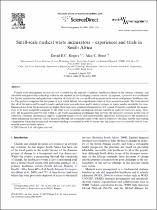JavaScript is disabled for your browser. Some features of this site may not work without it.
- ResearchSpace
- →
- Research Publications/Outputs
- →
- Journal Articles
- →
- View Item
| dc.contributor.author |
Rogers, DEC

|
en_US |
| dc.contributor.author |
Brent, AC

|
en_US |
| dc.date.accessioned | 2007-03-27T11:58:28Z | en_US |
| dc.date.accessioned | 2007-06-07T10:02:50Z | |
| dc.date.available | 2007-03-27T11:58:28Z | en_US |
| dc.date.available | 2007-06-07T10:02:50Z | |
| dc.date.issued | 2006 | en_US |
| dc.identifier.citation | Rogers, DEC and Brent, AC. 2006. Small-scale medical waste incinerators: experiences and trials in South Africa. Waste Management, vol. 26(11), pp 1229-1236 | en_US |
| dc.identifier.issn | 0956-053X | en_US |
| dc.identifier.uri | http://hdl.handle.net/10204/2104 | en_US |
| dc.identifier.uri | http://hdl.handle.net/10204/2104 | |
| dc.description.abstract | Formal waste management services are not accessible for the majority of primary healthcare clinics on the African continent, and affordable and practicable technology solutions are required in the developing country context. In response, a protocol was established for the first quantitative and qualitative evaluation of relatively low cost small-scale incinerators for use at rural primary healthcare clinics. The protocol comprised the first phase of four, which defined the comprehensive trials of three incineration units. The trials showed that all of the units could be used to render medical waste non-infectious, and to destroy syringes or render needles unsuitable for reuse. Emission loads from the incinerators are higher than large-scale commercial incinerators, but a panel of experts considered the incinerators to be more acceptable compared to the other waste treatment and disposal options available in under-serviced rural areas. However, the incinerators must be used within a safe waste management programme that provides the necessary resources in the form of collection containers, maintenance support, acceptable energy sources, and understandable operational instructions for the incinerators, whilst minimising the exposure risks to emissions through the correct placement of the units in relation to the clinic and the surrounding communities. On-going training and awareness building are essential in order to ensure that the incinerators are correctly used as a sustainable waste treatment option. | en_US |
| dc.format.extent | 383849 bytes | en_US |
| dc.format.mimetype | application/pdf | en_US |
| dc.language.iso | en | en_US |
| dc.publisher | Pergamon-Elsevier Science Ltd | en_US |
| dc.rights | Copyright: 2006 Pergamon-Elsevier Science Ltd | en_US |
| dc.subject | Waste management programmes | en_US |
| dc.subject | Incinerators | en_US |
| dc.subject | Health care clinics | en_US |
| dc.subject | Waste incinerators trials | en_US |
| dc.subject | Waste incinerators experiences | en_US |
| dc.subject | Health risks | en_US |
| dc.subject | South Africa | en_US |
| dc.subject | Environmental engineering | en_US |
| dc.subject | Environmental sciences | en_US |
| dc.title | Small-scale medical waste incinerators: experiences and trials in South Africa | en_US |
| dc.type | Article | en_US |
| dc.identifier.apacitation | Rogers, D., & Brent, A. (2006). Small-scale medical waste incinerators: experiences and trials in South Africa. http://hdl.handle.net/10204/2104 | en_ZA |
| dc.identifier.chicagocitation | Rogers, DEC, and AC Brent "Small-scale medical waste incinerators: experiences and trials in South Africa." (2006) http://hdl.handle.net/10204/2104 | en_ZA |
| dc.identifier.vancouvercitation | Rogers D, Brent A. Small-scale medical waste incinerators: experiences and trials in South Africa. 2006; http://hdl.handle.net/10204/2104. | en_ZA |
| dc.identifier.ris | TY - Article AU - Rogers, DEC AU - Brent, AC AB - Formal waste management services are not accessible for the majority of primary healthcare clinics on the African continent, and affordable and practicable technology solutions are required in the developing country context. In response, a protocol was established for the first quantitative and qualitative evaluation of relatively low cost small-scale incinerators for use at rural primary healthcare clinics. The protocol comprised the first phase of four, which defined the comprehensive trials of three incineration units. The trials showed that all of the units could be used to render medical waste non-infectious, and to destroy syringes or render needles unsuitable for reuse. Emission loads from the incinerators are higher than large-scale commercial incinerators, but a panel of experts considered the incinerators to be more acceptable compared to the other waste treatment and disposal options available in under-serviced rural areas. However, the incinerators must be used within a safe waste management programme that provides the necessary resources in the form of collection containers, maintenance support, acceptable energy sources, and understandable operational instructions for the incinerators, whilst minimising the exposure risks to emissions through the correct placement of the units in relation to the clinic and the surrounding communities. On-going training and awareness building are essential in order to ensure that the incinerators are correctly used as a sustainable waste treatment option. DA - 2006 DB - ResearchSpace DP - CSIR KW - Waste management programmes KW - Incinerators KW - Health care clinics KW - Waste incinerators trials KW - Waste incinerators experiences KW - Health risks KW - South Africa KW - Environmental engineering KW - Environmental sciences LK - https://researchspace.csir.co.za PY - 2006 SM - 0956-053X T1 - Small-scale medical waste incinerators: experiences and trials in South Africa TI - Small-scale medical waste incinerators: experiences and trials in South Africa UR - http://hdl.handle.net/10204/2104 ER - | en_ZA |






